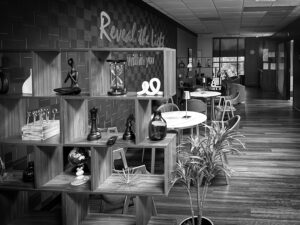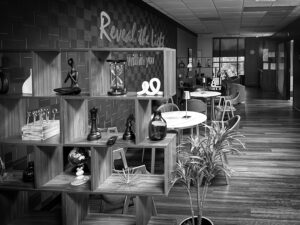When you compare the benefits of long-term addiction treatment, you discover sustained support, deeper healing, and improved chances of lasting sobriety. Whether you’re weighing residential care, a partial hospitalization program (PHP), or an intensive outpatient program (IOP), understanding how each level of care works will help you make an informed decision. At Nova Recovery Center in Charlotte, NC, you’ll find a structured, clinically grounded environment that guides you through every stage of recovery—ensuring you get exactly the support you need.
Explore levels of care
Each level of care offers a distinct balance of structure, intensity, and flexibility. As you review residential, PHP, and IOP options, you’ll see how treatment length and services align with your needs.
Residential treatment
Residential treatment, also called inpatient rehab, provides 24-hour care in a controlled setting. In a residential program you live on-site and follow a daily schedule that blends therapy, education, and healthy routines.
Key features:
- Live-in environment with clinical monitoring
- Individual and group counseling sessions
- Medication management during detox and stabilization
- Holistic therapies like yoga, meditation, and fitness
- Random drug testing to reinforce accountability
Typical lengths:
- Short-term stays: 30 to 90 days
- Long-term options: 6 months to 1 year [1]
Benefits:
- Deep immersion reduces external triggers
- Continuous access to medical and mental health professionals
- Strong peer support from residents facing similar challenges
- Structured days promote healthy habits
To compare inpatient and outpatient approaches in detail, see our guide on residential vs outpatient rehab in charlotte nc.
Partial hospitalization program
A partial hospitalization program bridges residential and outpatient care. You attend treatment at a clinic for several hours each day, then return home each evening.
Program structure:
- 5 days a week, 4–6 hours per day
- Intensive therapy mix: group, individual, and family sessions
- Medical monitoring and medication adjustments
- Life skills training and vocational support
Who it’s for:
- Individuals stepping down from inpatient care
- Those needing structured days but with safe home environments
- People balancing recovery with work or school obligations
Learn more about PHP specifics in our partial hospitalization program overview.
Intensive outpatient program
An intensive outpatient program offers flexibility while maintaining therapeutic intensity. IOPs are ideal once you can manage daily life with less supervision.
Program highlights:
- 3–5 days per week, 3–4 hours per session
- Behavioral therapies such as cognitive behavioral therapy and motivational interviewing
- Access to support groups and peer networks
- Continued medication management if needed
Advantages:
- Greater freedom to maintain family, work, or school roles
- Ongoing professional support to prevent relapse
- Smooth transition into independent living
For a deeper dive, explore how intensive outpatient treatment works and our comparison of PHP vs IOP addiction treatment explained.
Assess treatment outcomes
Longer stays in treatment consistently lead to stronger recovery outcomes. When you commit to an extended program, you give yourself the time and resources to rebuild life skills and resilience.
Increased sobriety rates
Studies show that spending at least 90 days in treatment markedly raises your chances of maintaining abstinence. Extending care to six or twelve months can improve those odds even further [1].
Success factors:
- Repeated practice of coping strategies
- Deeper exploration of underlying issues
- Stable environment to reinforce new habits
Holistic health and wellness
Long-term rehab goes beyond stopping substance use. Comprehensive care addresses physical, mental, and social aspects of recovery.
Core services:
- Physical health evaluations and medical care
- Mental health treatment for co-occurring disorders
- Family counseling and relationship repair
- Vocational support and educational resources
By tackling every facet of your well-being, you lay a stronger foundation for lasting change.
Relapse prevention
Extended programs build relapse prevention skills through:
- Ongoing therapy and peer support
- Random drug testing for accountability
- Gradual reintegration into daily life
- Aftercare planning with step-down services
These strategies mirror chronic disease management: continuous monitoring, adjustments, and support to minimize setbacks [2].
Choose the right program
Selecting the proper level of care depends on your unique situation. Consider these factors as you decide which option aligns best with your recovery goals.
Match your treatment needs
Severity and history of substance use:
- Severe or long-term addictions often require residential or PHP care
- Mild to moderate dependencies may succeed in an IOP setting
Co-occurring mental health disorders:
- Dual diagnosis benefits from integrated medical supervision in residential or PHP
- Stable mental health conditions can thrive in outpatient formats
Explore how to know if you need inpatient rehab for more guidance.
Consider personal circumstances
Support system:
- Strong family or stable housing may allow outpatient participation
- Limited home support or unstable environment often needs residential structure
Work and school commitments:
- Flexible schedules favor IOP
- Time away from obligations may call for PHP or inpatient stays
For help weighing factors, see our article on how to choose the right addiction treatment program.
Plan your continuum of care
An effective recovery journey involves step-down transitions:
- Residential care for intensive stabilization
- PHP for structured daytime support with nightly home stays
- IOP to reinforce skills and independence
- Ongoing outpatient counseling and peer support
Mapping your continuum of care in addiction recovery ensures you maintain momentum and prevent relapse.
Prepare for treatment
Knowing what to expect helps you walk into long-term rehab with confidence. Here’s how Nova Recovery Center sets you up for success.
Initial assessment and detox
- Comprehensive evaluation of medical, psychological, and social needs
- Medically supervised detox with medication management when appropriate
- Personalized treatment plan outlining goals and timelines
Therapy and support services
- Individual therapy targeting triggers and thought patterns
- Group sessions fostering camaraderie and shared insights
- Family education and counseling to rebuild trust and communication
- Holistic activities such as art therapy, mindfulness, and physical fitness
Continuing care strategies
Ongoing support is key to lasting recovery. We integrate evidence-based methods such as:
- Recovery Management Checkups to monitor progress [3]
- Mobile health tools for real-time encouragement and reminders
- Incentives for attendance and abstinence to boost engagement
- Peer support groups like SMART Recovery and Alumni Networks
These measures reinforce skills learned during treatment and help you stay connected to a supportive community.
Start your recovery journey
Taking the first step toward lasting change begins with reaching out. At Nova Recovery Center, our team of experienced professionals is ready to guide you through every phase of care.
What you can do now:
- Call our admissions line to discuss your needs and explore program options
- Schedule a confidential assessment to determine the best level of care
- Download our guide on what to expect during outpatient rehab
- Review success stories and program outcomes on best rehab programs in charlotte nc
Your path to renewed health, personal growth, and sustained sobriety starts here. Contact us today to discover how long-term addiction treatment can transform your life.








